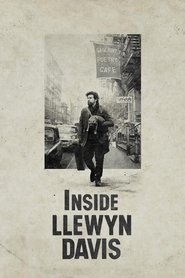The film’s illusion of ultra-realism is tempered by a propensity toward exaggeration that somehow manages to amplify faces, sights, and behaviors in a way that not only doesn’t counteract the realist mode, but works with it, in tandem. As complicated as memory, and as corrupt as nostalgia, Inside Llewyn Davis, which places a premium on historical fidelity […] produces for the viewer sensations that don’t just address “what it was like,” but “what it felt like”—affidavit and lyrical reflection somehow entangled and inseparable.[…]
A more on-the-nose title might be Llewyn Davis, Outside, for, though we might correctly infer what’s going on in Llewyn’s mind throughout most of the film, he’s a noble gas of a human being, letting nothing in, eternally failing or refusing to integrate—or, in chemistry language, to react—even to the scene of his habitation.
— Jaime N. Christley (Slant Magazine)
The type of indie romantic that audiences were keen to project onto in 2013 had to be flawed, even in a controlled, Hollywood storytelling manner, in order to invite the most relatability. Who hasn’t felt destructive and misguided when it comes to romantic and creative expression, so long as their behavior isn’t too alienating? A pre-A24 indie-pop audience needed as much opportunity as possible to feel personally, artistically represented on-screen. Combined with Llewyn and [Her's] Theodore’s coiffed scruffy hair and movie-star looks (plus the fact that they are white, straight men inhabiting worlds devoid of the nuances of queerness or race), and the limits of inviting such specific intimacy are clear.
— Rory Doherty (Paste Magazine)
Once a significant character’s name is revealed to be Ulysses, [the] viewer gathers a sense of why Llewyn wanders, mooching and occupying his friends’ couches for the night, or traveling deep into the underworld on a road trip to Chicago. He’s a stray cat and a Homeric hero all at once.[…]
There’s a scene shown near the beginning of the film and, like clockwork, seen again at the end. […] The scene’s looping quality, the sequence encapsulates the mystique inherent to the Coens’ cyclic approach. At first, Llewyn appears to be the victim of a random beating; the second time around, it’s a well-deserved thrashing and another in a long succession of self-perpetuated punishments. Inside Llewyn Davis is a fascinating exploration in this regard, allowing the audience to consider, and then re-consider the character after we’ve become versed in his pattern of behavior. Though we may not particularly like Llewyn Davis, we understand him, his ambition, and his failure, and we cannot help but feel something profound toward his tale of melancholy.
— Brian Eggert (Deep Focus Review)
Ultimately, Llewyn is an unlikable character who is hard to dislike, another take on the anti-hero that permeates our modern media landscape. But despite this familiar trope, the Coens have created a film that is wholly original and highly entertaining.
— Jonah Flicker (Paste Magazine)
The Coens allow us to be unsure about the point of Llewyn's music: is it obviously brilliant and destined for success? Or is the point rather that he is talented, but not in a way that guarantees triumph?
— Peter Bradshaw (The Guardian)

